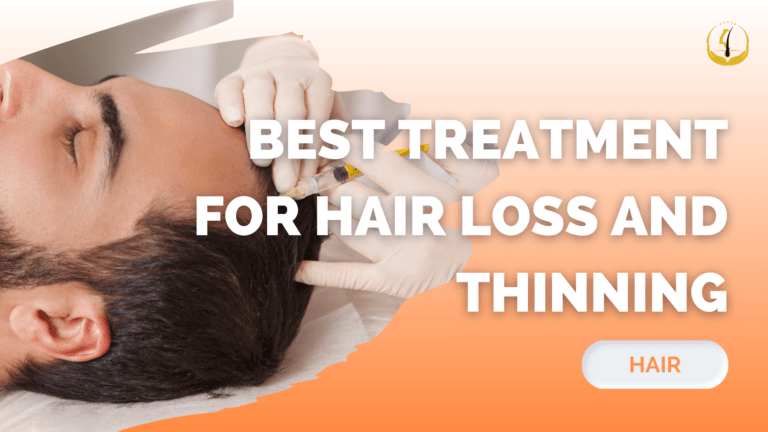Hair loss can be a distressing experience, impacting one’s self-esteem and confidence. Whether you’re dealing with a receding hairline, thinning hair, or bald spots, it’s essential to know that effective treatments are available. In this blog post, we’ll explore some of the best treatments for hair loss and thinning, including hair transplants, medication, and innovative solutions like Platelet-Rich Plasma (PRP) therapy. By the end of this article, you’ll have a better understanding of your options and how to combat hair loss effectively.
What is Hair Loss?
Before delving into the treatments, it’s crucial to understand the common causes of hair loss. Hair loss can result from various factors, including genetics, hormonal changes, stress, poor nutrition, and medical conditions. Identifying the cause can help you choose the most suitable treatment.
Medication for Hair Loss
One of the most accessible and widely used treatments for hair loss is medication. Two FDA-approved medications stand out in the battle against hair loss:
- Minoxidil: This topical medication is available over the counter and comes in liquid or foam form. It works by increasing blood flow to hair follicles, promoting hair growth and strengthening existing hair. Minoxidil is a suitable option for both men and women.
- Finasteride: This prescription medication is specifically for men and works by blocking the hormone DHT, which is responsible for hair follicle miniaturization and eventual hair loss. Finasteride has been shown to be effective in preventing further hair loss and promoting regrowth.
- SMART™ Medication Protocol: SMART™ Medication Protocol was invented by Professor Dato’ Dr. JasG to help those with hair loss. Using his very own formula, SMART™ Medication Protocol is able to promote new hair growth and maintain a healthy scalp, and is only available at GLOJAS clinic.
While these medications can slow down hair loss and, in some cases, stimulate hair growth, they require ongoing use to maintain results. It’s essential to consult with a healthcare professional before starting any medication for hair loss, as they can advise you on the most appropriate treatment plan.
Hair Transplants
Hair transplants have gained immense popularity as a long-term solution for hair loss. The two most common methods of hair transplantation are Follicular Unit Excision (FUE) and Follicular Unit Transplantation (FUT).
- FUE Hair Transplant: FUE is a minimally invasive hair restoration procedure that involves extracting individual hair follicles from a donor area (usually the back or sides of the head) and transplanting them into the balding or thinning areas. The procedure is precise, leaves minimal scarring, and provides natural-looking results.
- FUT Hair Transplant: FUT (Follicular Unit Transplantation) involves the removal of a long, thin piece of tissue from the back of the scalp. Stereo-microscopic dissection is then used to remove individual follicular units from the strip. The wound is closed after the follicles have been harvested; however, this will leave a linear scar.
FUE hair transplants offer a permanent solution to hair loss, making it a popular choice for individuals seeking a more permanent solution. The recovery time is relatively short, and the results are typically impressive compare to FUT hair transplants.
Platelet-Rich Plasma (PRP) Therapy
Platelet-Rich Plasma (PRP) therapy is an innovative and non-surgical approach to combat hair loss. PRP is derived from your blood and contains growth factors that stimulate hair follicles, promoting hair growth and strengthening existing hair. The procedure involves the following steps:
- A small amount of blood is drawn from your arm.
- The blood is then processed to separate the platelet-rich plasma from other components.
- The PRP is injected into the scalp in areas with hair loss or thinning.
PRP therapy is often used in conjunction with other treatments, such as medication or hair transplants, to enhance results. It’s a safe and effective option for those looking to improve the quality and density of their hair.
Hair Loss Tips and Solutions
In addition to the mentioned treatments, there are several hair loss tips and solutions that can complement your chosen approach:
- Healthy Lifestyle: Proper nutrition and regular exercise contribute to overall well-being, which can positively impact hair health.
- Stress Management: Chronic stress can exacerbate hair loss. Engaging in stress-reduction techniques like meditation or yoga can be beneficial.
- Scalp Care: Using gentle shampoos and avoiding harsh chemicals can maintain a healthy scalp environment.
- Avoid Tight Hairstyles: Hairstyles that pull on the hair can lead to hair loss. Opt for looser styles to reduce tension on the hair follicles.
- Consult a Specialist: If you’re unsure about the cause of your hair loss or the most suitable treatment, consult a dermatologist or hair restoration specialist. They can provide personalized guidance.
Dealing with hair loss and thinning can be challenging, but it’s important to remember that effective treatments and solutions are available. Whether you choose medication, a hair transplant, PRP therapy, or a combination of these options, the key is to take action early and consult with professionals who can guide you toward the best treatment plan for your specific needs.
Remember that maintaining a healthy lifestyle and following hair loss tips can also contribute to your overall success in regaining your hair’s fullness and your confidence. With the right approach, you can unlock a world of possibilities and restore your self-esteem, one strand of hair at a time.
Click the link to learn more about Hair Loss: “What Are The Best Vitamins For Hair Loss?”
At Glojas, we welcome clients to reach out to us directly to schedule a free initial consultation. We offer guidance and valuable insights on how best to address your specific challenges. Let us assist you in navigating your journey with confidence and clarity.







